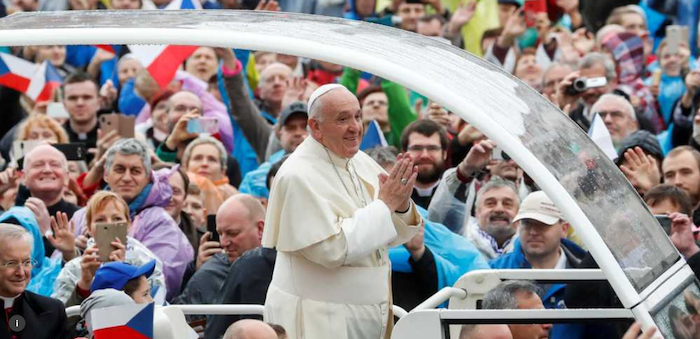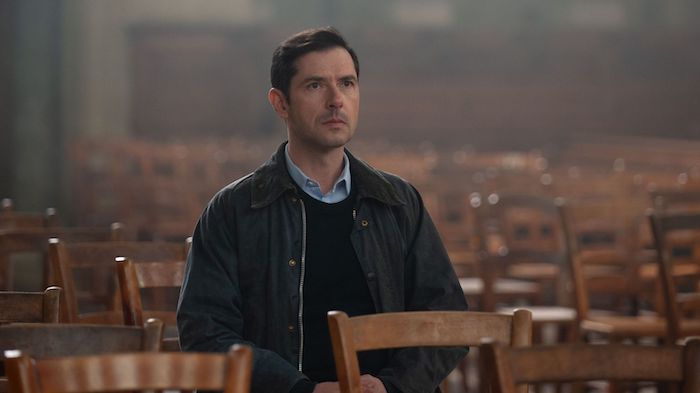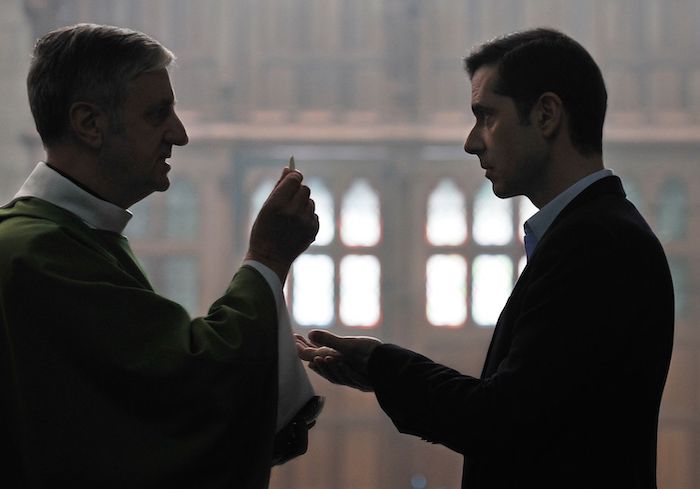— And Defied Centuries Of Catholic Tradition
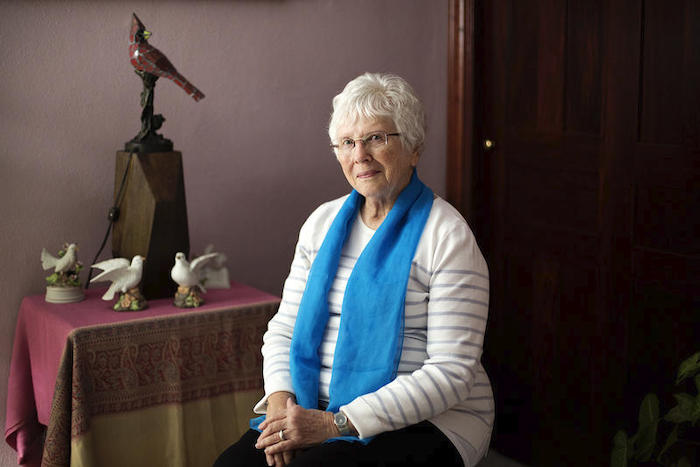
Elsie McGrath never thought of herself as a rulebreaker.
But in 2007, she broke one of the most fundamental rules in Roman Catholicism when she became an ordained priest.
She was later excommunicated, along with fellow priest Rose Marie Hudson and Bishop Patricia Fresen, who ordained the two.
Women are barred from joining the Roman Catholic clergy, but McGrath is hopeful that will change. Last month, Pope Francis caused a stir when he said the Vatican would explore the possibility of female deacons, a class of ministry allowed to oversee weddings and baptisms but not provide Communion.
McGrath spoke with St. Louis Public Radio’s Shahla Farzan about her call to priesthood and her hopes for the future of the Catholic Church.
On converting to Catholicism
I became a Catholic in 1956 after I married a Catholic at the age of 17. There was nothing to it, because Catholics in those days were very “tunnel vision” and out to save the world all by themselves. Nobody could be saved if they didn’t join the fold, and there was nothing to joining the fold except saying, “Yes, yes, yes” and not questioning anything.
Having been raised as, “Do what we tell you and always obey the rules and everything will be wonderful,” I thought: “This is pretty good. I’ll just be Catholic, and I will do as they say and obey the rules and everything will be good.” And then Vatican II happened, and everything started falling apart. I felt they were abandoning me, taking away my security blanket of having all the answers and leaving me looking for my own answers. And then I started getting enlightened and got on the bandwagon for changing things.
On watching her husband, Jim, become an ordained deacon
I had already gotten an undergraduate degree in theology from St. Louis University. My plan was to go into a master’s program after I got my undergrad degree, but because (Jim) was going into the diaconate, I put that off until he was finished because we went through his diaconate formation together. All of the women were encouraged to do the classes with their husbands, which was a four-year preparation at that time. I went through the whole thing with him because he was so enthusiastic about it, and I was so happy for him that he was making this move.
Jim became a deacon in 1996. I was good with it right up until the very moment that we went into the cathedral for the ordination ceremony. We walked down the aisle together as couples. When we got to the altar rail, the women got to move out of line and sit down in the pew and the men advanced up onto the altar. At that point is when I first realized how absolutely awful and unjust this whole thing was. I felt like I had been stabbed. I was totally unprepared for the reaction I would have.
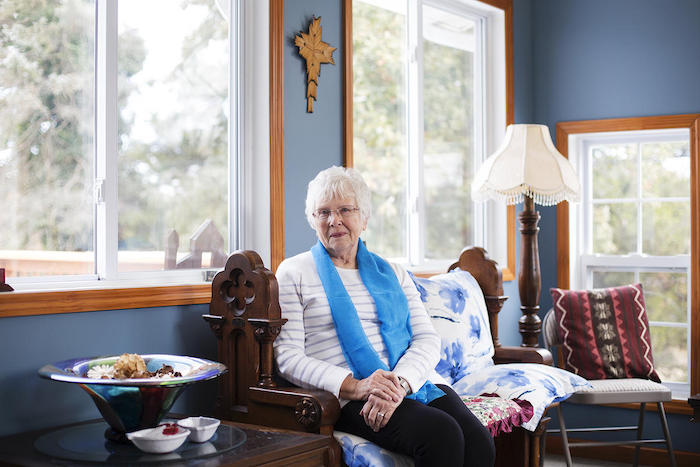
On meeting Bishop Patricia Fresen, the leader of the women priests movement
Becoming a priest was literally the farthest thing from my mind, except for the injustice of women not being allowed to. In 2006, Patricia Fresen came to St. Louis, and I thought, “I really need to go hear what this woman has to say, because I have discounted these women priests, but I really don’t know anything about them.”
My friend called and said, “I’m going to have a little wine-and-cheese party at the house on Friday evening for Patricia Fresen to be able to meet a few people. Why don’t you come over?” Well, I didn’t really want to do that. I didn’t want to meet her up close and personal, but I went. I walked into the front door of the house, and Patricia was sitting right there. As I walked in, we locked eyes with each other. I had no idea it was her, but I said to myself, “I have got to meet this woman.” The funny thing is that I had not an inkling that this was ever in my mind or my heart until I locked eyes with Patricia Fresen.
On being called to the priesthood
I questioned my own motives, especially because this all happened so quickly and I was completely unprepared for it. I kept wondering, “Why are you really doing this? Are you trying to prove something? Does this have to do with your ego?” It took me from June until November to come to the conclusion that this was something that I really, really was being called to do.
This had nothing to do with me personally; this was what the spirit within me was leading me to, and it made perfect sense. Why else would I have spent all of those years getting all of those theology degrees? Everybody would say, “What are you going to do with that? I guess you think you’re going to be a priest or something?” I would say: “I just love theology. I can’t get enough of it.” The more I know of it, the better I can help the people that I’m working with in the church. This was a monumental step forward in educating people about what church really ought to be.
On her ordination ceremony
[Archbishop] Burke made it clear that anyone who even attended this “attempted ordination ceremony” was going to be excommunicated right along with us. Some of them knew that they were treading on thin ice, but they wanted to be there anyway. [Editor’s note: McGrath’s husband died in 1998.]
We had scads of religious sisters there. We had a drum circle before the ceremony in the corner of the synagogue, and most of them were religious sisters. They didn’t say anything, they didn’t look up, they didn’t look around. And when it came time for everything to start, they just kind of quietly disappeared again.
The whole ceremony was just otherworldly. It was almost like I was floating above somewhere and looking down on what was happening. We processed back out of the sanctuary and the three of us are standing there, Patricia and Ree (Rose Marie Hudson) and me. Here comes this guy straight up, almost ahead of everybody. He works his way through all of those people, and he serves all three of us with the latest document from Burke, the summons. It said, “You have just committed the gravest of sins and you have until,” I believe, “December the third to recant.” In March, the actual decree of excommunication showed up.
On being excommunicated from the Catholic Church
Excommunication is literally a contract. It’s a legal document, and that means that it has to be accepted by both parties for it to actually be in force. We see ourselves as Roman Catholic women who have chosen to be ordained and model a new way of being in the church. We do not accept excommunication, and therefore, we’re not excommunicated.
We don’t need “the Church.” Whenever we talk about “the Church,” we’re literally talking about the hierarchy of the church. But the church itself is us. Our choice is to remain in the church and effect change from the bottom up, because that’s the only way change ever happens anywhere.
On leading Therese of Divine Peace, a Roman Catholic congregation in St. Louis
We have about two dozen faithful members. Everyone is welcome at the table; that is the biggest thing. You don’t have to show papers to receive Communion. At the famous Last Supper, Jesus even served Judas before Judas left the room. If this is the sacrament of unity, how can anybody possibly be barred from the table? If you believe that you are in a community of people who are faithful to living the way Jesus did, what’s going to stop you from sharing bread and wine?
The Roman Catholic piece keeps a lot of people away from us for two very big reasons. One, they don’t want anything to do with the Roman Catholic Church anymore. Or two, they don’t want to take the chance of getting in trouble, because the Roman Catholic Church is so important to them.
On the possibility of women being ordained in the Catholic Church
Pope Francis has done a lot to move things along from the stagnation that we were in with the two before him. He’s softening his stance because he’s understanding that we might have something important to offer the church.
We absolutely know that it will change. Anybody could throw out a figure of when this is going to happen. We’re not going to see it happen from this particular lifetime, but that’s what we’re doing it for.
Complete Article ↪HERE↩!

